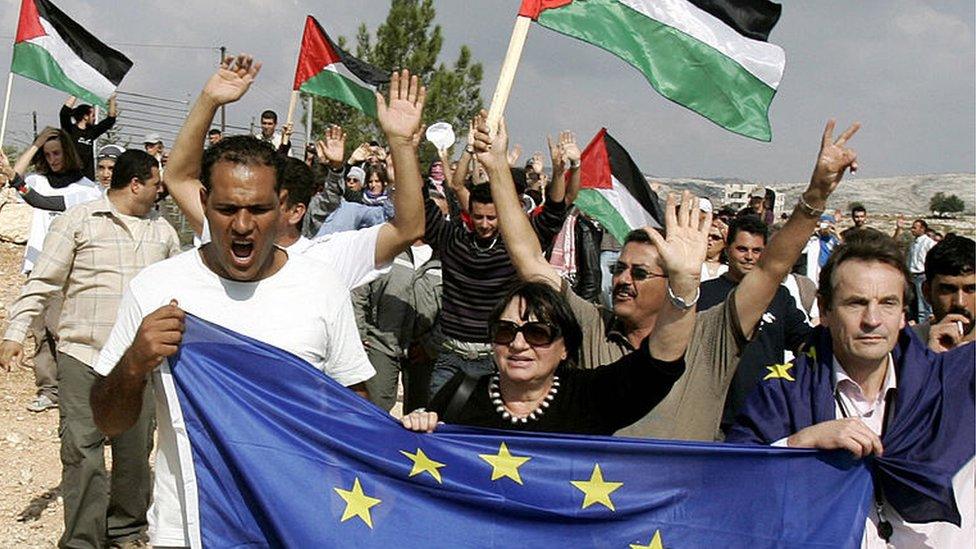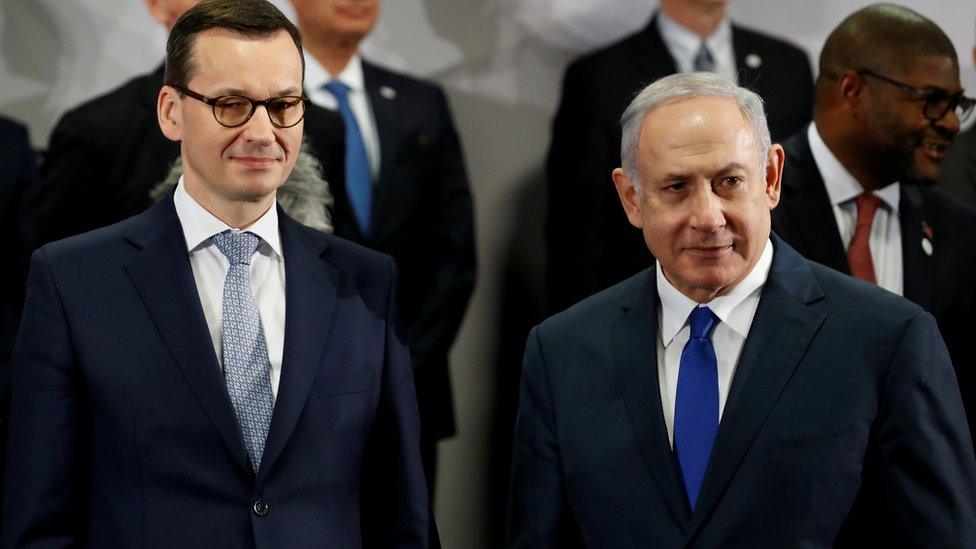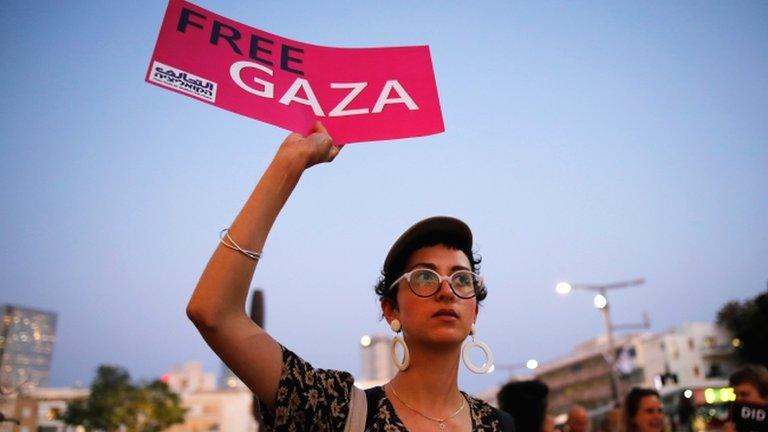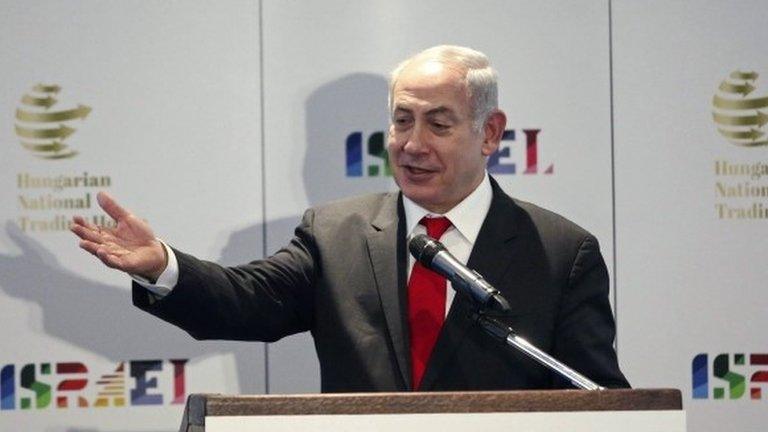Why Israel eyes the EU with distrust
- Published

Many Israelis love Eurovision, but think Europe is against them
Walk down the sea front in Tel Aviv in recent weeks and you cannot fail to grasp the gusto with which people here embraced the concept of Eurovision; the posters, the parties, the wall-to-wall media coverage all testament to the enthusiasm which Israelis invested in the competition.
And all this in a part of the world where the bling and kitsch could sit uncomfortably alongside security concerns and regional tensions.
Yet to some, like Yohanan Plesner, president of the Israel Democracy Institute think tank, Eurovision revealed Israel's latent desire to belong.
"We always have this craving for recognition for being a part of Europe, for being recognised as a legitimate member," he tells me, "and to be noticed and mentioned and covered in the media, not only with respect to conflicts but rather with respect to happy events, like singing contests."
But Israel's love of Eurovision the competition has also illustrated its more ambiguous attitude to Europe the continent.
If you speak to Israelis, some will tell you how Europe is their biggest trading partner, how they love going on holiday there and of their many ancestral family connections.

Israel regards the EU as too pro-Palestinian
Yet many also say they see Europe as a source of anti-Semitism, a place where the Holocaust is becoming less prominent in the minds of a new generation of young people.
And many also see Europe as a source of what they see as unfair criticism for their government's policies towards Gaza and the West Bank, coupled with a failure to understand Israel's existential security threat.
"They tend to view Europe as preaching solely at Israel and dismissing every other human rights violations in the world," says Dahlia Scheindlin, a pollster and political strategist.
"They also see Europe as hypocritical because of Europe's own history with relation to the Jews. You hear this very commonly in Israel - 'look what they did to us just 70 years ago, and here they are telling us about human rights'."
There is little attempt, she adds, to understand a European political culture that favours liberal democracy and emphasises human and civil rights.
'Fed up'
To this cultural concern about Europe one must add an institutional distrust. I have spoken to few Israelis who do not roll their eyes at the mention of the European Union.
Many see it as an organisation that has taken sides in their conflict with the Palestinians, others condemn it for providing aid that sometimes ends up in the hands of groups like Hamas, which the EU regards as a terrorist organisation.

Israel says EU money is being used to fund militant activities in Gaza
In Eshkol, along the border with Gaza, I met Ilan Isaacson, the civilian head of security, whose job is to protect the 16,000 Israelis in his sector from rocket and incendiary kite and balloon attacks.
He said he wanted the EU to keep giving money to the Palestinians, to provide food and build schools and homes. But: "Unfortunately the money in the last couple of years is coming and the Hamas and the [Palestinian Islamic] Jihad is taking most of the money and building terrorist tunnels, building a huge arsenal of missiles... Many people are fed up and Europe is the last group that has any relation with them."
The EU insists that the support it gives to the people of Gaza is humanitarian relief, providing food and health care to thousands of Palestinians coping with the consequences of Israel's economic blockade.
Israel says it tightly controls its border with Gaza to prevent weapons reaching Hamas. Egypt also maintains a blockade of Gaza's southern border for its own security reasons.
'Out of sync'
This sentiment is fanned by Israel's recently re-elected prime minister, Benjamin Netanyahu, who before Christmas described the EU as "hostile and hypocritical".
He has begun forming new alliances with central and eastern European countries like Poland and Hungary whose leaders share his robust nationalism and suspicion of Brussels.
This attempt to divide the EU is already paying dividends: last month Hungary refused to back an EU statement at the United Nations criticising Israel's settlement building in the occupied territories.
European diplomats take some of this criticism with a pinch of salt and say the EU is a "useful whipping boy" for Israel at a time when it is so close to the Trump administration.
They also point to the significant trade and security relationships Israel has with many EU countries that neither side wish to imperil.
But they also fear that Israel's political narrative about the EU is "out of sync with reality", claiming that some Israelis now believe their country has a better relationship with Saudi Arabia than with Europe.
'Listen to criticism'
This distrust with the EU is not limited to Israel: some Palestinians are equally frustrated. In Ramallah, I met Dr Nour Odeh, an adviser to the Palestinian government, who accused the EU of political cowardice.
"European countries say the right thing but are shying away from assuming their responsibilities," she says.

The EU says it is an important partner in peace
"If the Europeans are seriously committed to the two-state formula, they need to defend it and defend it by recognising Palestine, by saying there are two states in this formula, by making sure the occupation is actually costly rather than profitable for Israel."
This dissatisfaction with Europe matters because the US administration is expected shortly to unveil its long-awaited plan to try to resolve the conflict between the Israelis and Palestinians.
There is little optimism about the plan but diplomats say that for there to be any hope of success, it needs the backing of not just a few Arab states but also the international community, and that includes Europe.
Alistair Burt, the UK's former Middle East minister, told me that Israel in particular should not just rely on US support.
"It is unhelpful not to recognise the importance that other partners and neighbours can have… they should listen to criticism and they should recognise that a partnership with Europe is of fundamental importance, just as much as the US."
But right now that view is not widely shared in Jerusalem or Washington.
- Published17 May 2019

- Published18 February 2019

- Published17 May 2019

- Published19 July 2017
